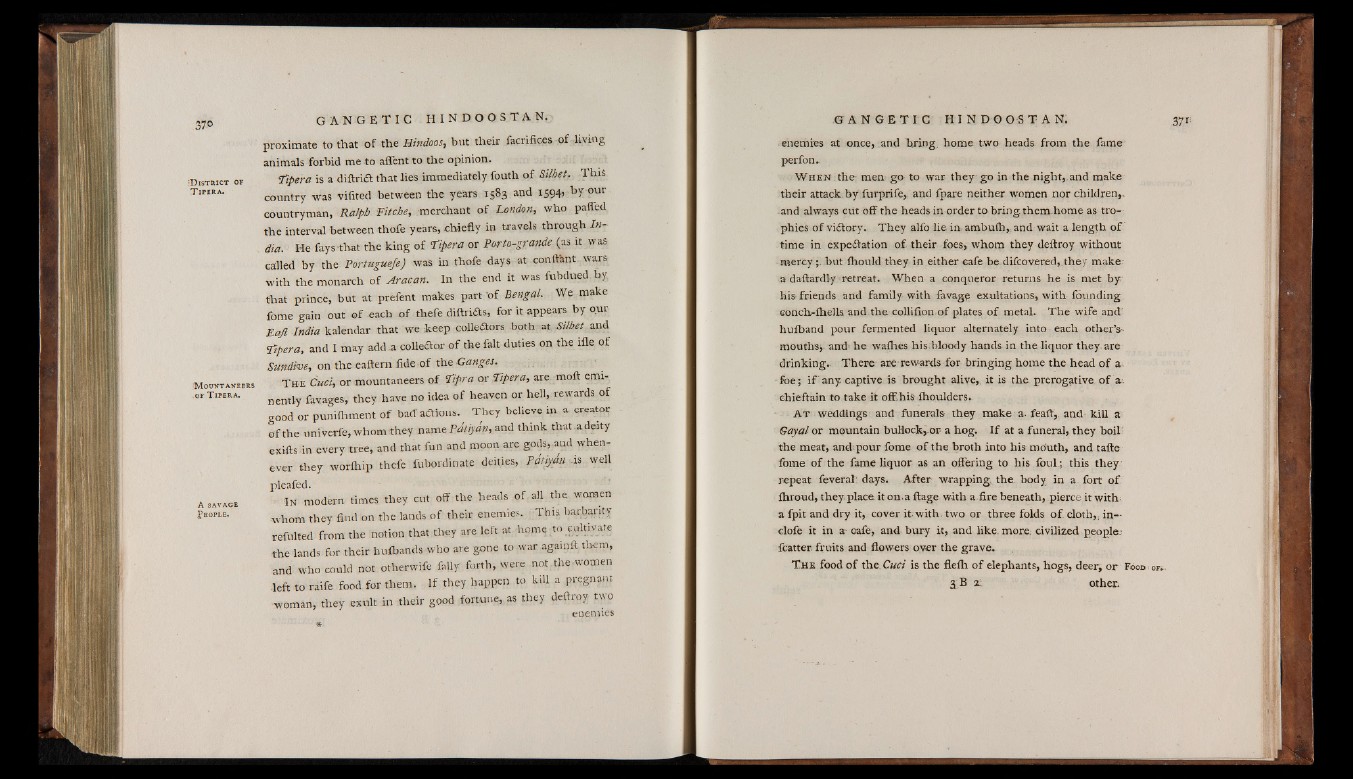
¡ D i s t r i c t o f
T i p e r a .
■Mo u n t a n e e r s
,o f T i p e r a .
A SAVAGE
P e o p l e .
G A N G E T I C H I N D O O S T A N .
proximate to that o f the Hindoos, but their facrifices of living
animals forbid me to affent to the opinion.
Tipera is a diftria that lies immediately fouth of Silbet, This
country was vifited between the years 1583 and 1594, by our
countryman, Ralph Fitche, merchant of London, who paffed
the interval between thofe years, chiefly in travels through India.
He fays that the king of Tipera or Porto-grande (as it was
called by the Portuguefe) was in thofe days a t content wars
with the monarch of Aracan. In the end it was fubdued by
that prince, but at prefent makes part ‘of Bengal. We make
fome gain out o f -each o f thefe diftrifts, for it appears by our
Paft India kalendar that we keep collectors both at Silbet and
Tipera, and I may add a colleaor of the fait duties on the ifle of
Sundive, on the eaftern fid eo f the Ganges.
T h e Cuci, or mountaneers o f Tipra or Tipera, are moft eminently
favages, they have no idea of heaven or hell, rewards of
good or punilhment of bad' actions. They believe in a creator
of the u n i v e r f e , whom they name Patiyan, and think that-adeity
exifts in every tree, and that fun and moon are g o d s , .aud whenever
they worfhip thefe fubordinate deities, Patiyan as well
pleafed.
I n modern times they cut off the heads o f all the women
whom they find on the lands of their enemies. This barbarity
refulted from the notion that they areleft at h o m e ; n .cultivate
the lands for their huibandswho are gone to war againft them,
and who could not otherwife fally forth, were not the ¡women
•left to raife food for them. If they happen to kill a pregnant
woman, they exult in their good fortune, as they dettroy two
enemies
enemies at once, and bring home two heads from the fame
perfon.
W hen the- men go to war they go in the night,, and make
their attack by furprife, and fpare neither women nor children,,
and always cut off the heads in order to bring, them home as trophies
of victory. They alfo liein. ambuih,. and wait a length o f
time in expectation o f their foes, whom they deftroy without
mercy;. but fhould they in either Gafe be diicovered, they make-
a daftardly -retreat. When a conqueror returns he is met b y
his- friends and family with favage exultations, with founding
conch-ihells and the collifion of plates o f metal. The wife and'
huiband pour fermented liquor alternately into each other’s-
mouths, and1 he waihes his,bloody hands in the liquor they are
drinking. There are rew-ards for bringing home the head o f a
foe; i f any captive is brought alive,, it is the prerogative o f a-,
chieftain to take it offihis ihoulders.
A t weddings and funerals they make a- feaft, and kill a
Gayal or mountain bullock,.or a hog* I f at a funeral, they boil'
the meat, and ¡pour fome of the broth into his mouth, and tafte
fbme of the fame liquor as an offering to his foul; this they
repeat feveral: days. After wrapping, the body in a fort of
{hroud, they place it on. a ftage with a fire beneath, pierce it with ,
a fpit and dry it, cover it with, two or three folds o f doth,., in—
clofe it in a- oafe, and bury it, and like more; civilized people;
fcatter. fruits and flowers over the grave.
T h e food of the Cuci is the flelh o f elephants, hogs, deer; or Food
3 B 2.. other.